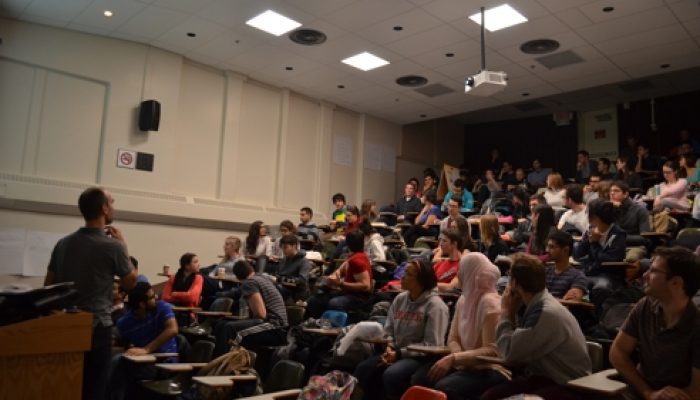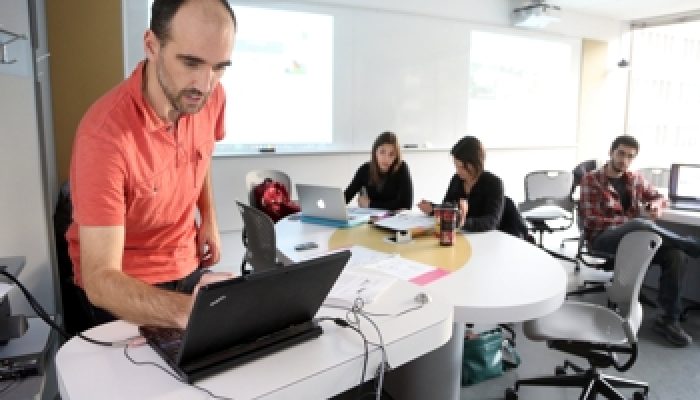Geology for Global Development are involved in an international project on Sustainable Resource Development of the Himalaya (see www.gfgd.org/projects/himalayas2014), which will cumulate in the delivery of a students’ programme in Ladakh, India, in June 2014. The programme will include lessons on resources, climate, earthquakes and landslides. GfGD have particular responsibility for delivering the ...[Read More]
GeoSphere
Opening of #AESRC2014
Today marks the opening of the 13th annual AESRC conference at uOttawa. The AESRC (Advances in Earth Science Research) is the geology conference in Canada that is organized by and for graduate students only. This year uOttawa is the host and March has been a ridiculously busy month preparing to host AESRC for over 120 delegates including faculty from uOttawa and other Canadian geology departments ...[Read More]
Green Tea and Velociraptors
The future of scientific publishing
Last night, the Society of Spanish Researchers in the UK, SRUK, hosted an event discussing the past, present and future of scientific publishing (event details). One thing that was nice about this discussion, compared to previous ones I’ve attended in London, was the number of practising academics in the room. Often, academics are excluded from the discussions about scholarly publishing, whi ...[Read More]
Geology for Global Development
Friday Photo (121) – Landscapes of Ladakh
Next week we’ll be announcing two new ways you can get involved with our hazards education programme in Ladakh (taking place in June 2014). Here is another of Rosalie Tostevin’s fantastic images from the region. Credit: Rosalie Tostevin
Between a Rock and a Hard Place
Science Snap (#22) Landslide in Washinton state
This week, the world has been shocked by images of devastation after a huge landslide buried the town of Oso, north of Seattle, in Washington state, USA. At 11:00 PDT on Saturday 22nd March 2014, a 500m-wide section of mud and rock became detached from a hillside above the 180 population town, and hurtled down the slope at high speed. Deposits from the landslip are up to 6m deep and cover over a s ...[Read More]
Geology for Global Development
New GfGD University Groups
Over the past month we’ve been working with students at the University of Durham and Camborne School of Mines (University of Exeter) to establish and launch new GfGD University Groups. These groups will join our existing network of groups, based in Cambridge, Imperial College, Leeds, Leicester, Oxford, Plymouth, Southampton, UCL and Trinity College Dublin. University Groups are an opportunit ...[Read More]
WaterUnderground
Active learning in large classes: a gallery ‘walk’ with a 100 students
Active learning in large classrooms is difficult but not impossible – here is one example of an active learning technique developed for small classrooms, the gallery walk, which I have successfully re-purposed for a class of 100 (but I see no real upper limit on class size with the modified version of this activity). “In Gallery Walk student teams rotate to provide bulleted answers to questi ...[Read More]
WaterUnderground
The coolest groundwater paper of 2013!
What paper inspired you the most in 2013? The Early Career Hydrogeologists’ Network (ECHN) of the International Association of Hydrogeologists (IAH) has announced a new contest: ‘2013 Coolest Paper of the Year’ award (described in this Hydrogeology Journal editorial). I nominated Fan et al (Science, 2013) who completed a Herculean effort to map the depth to the water table globally for the f ...[Read More]
WaterUnderground
Co-teaching a blended class across universities: why? and why not?
This term I am co-teaching a graduate class in advanced groundwater hydrology with Grant Ferguson (University of Saskatchewan) and Steve Loheide (University of Wisconsin – Madison). In co-developing and co-delivering this course we have learned a lot – I’ll start here with our initial motivations and write later about our pedagogic decisions, software tools and reflections after the course. It is ...[Read More]
WaterUnderground
Why read “Water Underground” blog? And for me, why write a blog?
My reason to blog is really quite simple: to share what doesn’t currently fit into peer-reviewed articles. I will write about groundwater as well as how I research, teach, supervise and collaborate. In short I hope to cover the whole kit and caboodle of academia, from the underground perspective of groundwater. Why read this blog? Time is precious so only read on if you are interested and/or passi ...[Read More]



